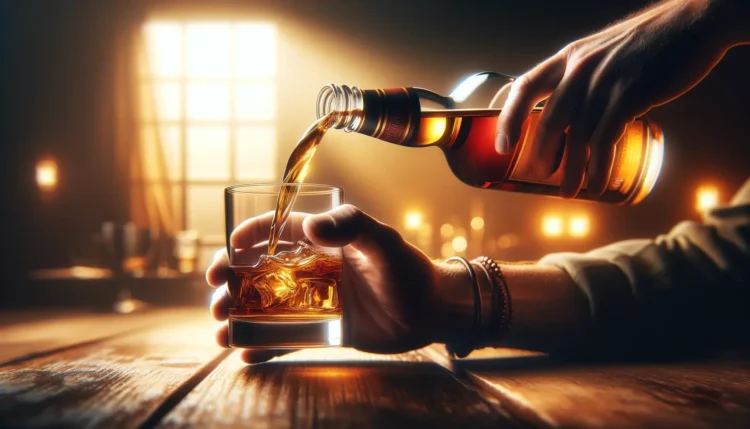Did you know that alcohol consumption is closely linked to erectile dysfunction? It’s true. In fact, studies have shown that alcohol-induced erectile dysfunction affects a significant number of men worldwide.
Alcohol can have both short-term and long-term effects on erectile function. In the short term, consuming alcohol can temporarily impair a man’s ability to get an erection by affecting hormone levels, the nervous system, and circulation.
And in the long term, chronic alcohol abuse can cause permanent damage to blood vessels and nerves, leading to chronic erectile dysfunction.
If you’re curious to learn more about how alcohol contributes to erectile dysfunction and its impact on male sexual health, keep reading. We’ll explore the relationship between alcohol and erectile dysfunction, as well as the short-term and long-term effects of alcohol consumption on erectile function.
Key Takeaways:
- Alcohol consumption is closely related to erectile dysfunction.
- Short-term effects of alcohol on erectile dysfunction include decreased sensitivity, dehydration, and decreased testosterone levels.
- Long-term effects of alcohol abuse can damage nerves, increase the risk of cardiovascular disease, and cause blood vessel damage, all of which can contribute to erectile dysfunction.
- Reducing alcohol intake and seeking help for alcohol abuse can improve erectile dysfunction.
- Occasional erectile dysfunction is normal, but if it becomes a recurring problem, it may be a sign of an underlying health condition or alcohol use disorder.
Short-term Effects of Alcohol on Erectile Dysfunction
Consuming any amount of alcohol can have short-term effects on erectile dysfunction. Several factors contribute to these effects:
- Decreased sensitivity and impaired transmission of information: Alcohol can temporarily decrease sensitivity and impair the transmission of information between the brain and the penis. This can result in a temporary inability to achieve an erection.
- Alcohol as a diuretic: Alcohol acts as a diuretic, causing dehydration. Dehydration can narrow blood vessels and limit blood flow to the penis, making it more difficult to achieve or maintain an erection.
- Impact on testosterone levels: Alcohol consumption can decrease circulating testosterone levels. Testosterone is crucial for maintaining sexual health and function. Lower testosterone levels can negatively affect erectile function.
- Limiting nitric oxide production: Nitric oxide is necessary for relaxing the blood vessels in the penis and promoting blood flow. Alcohol can limit the production of nitric oxide, further impacting erectile function.
These short-term effects highlight the immediate impact that alcohol can have on erectile function. Limiting alcohol consumption or abstaining from alcohol can help alleviate these effects.

While the short-term effects of alcohol on erectile dysfunction are important to understand, it’s essential to recognize the long-term effects as well. These effects will be explored in the next section.
Long-term Effects of Alcohol on Erectile Dysfunction
Chronic alcohol abuse can have detrimental effects on various body systems, contributing to the development of erectile dysfunction. The chronic consumption of alcohol can result in damage to the nerves, an increased risk of cardiovascular disease, and blood vessel damage, all of which can directly impact erectile function.
Heavy alcohol users commonly experience dysfunction of the autonomic nervous system, with erectile dysfunction being a prevalent symptom. This dysfunction can disrupt the normal physiological responses required for achieving and maintaining an erection.
There is a significant relationship between alcohol consumption and cardiovascular disease. Prolonged heavy drinking is associated with an increased risk of developing high blood pressure, a known risk factor for erectile dysfunction. Furthermore, binge drinking has been linked to blood vessel damage, further aggravating the risk of erectile dysfunction.
Alcohol-induced blood vessel damage can impair the proper flow of blood to the penis, resulting in difficulties in achieving and sustaining an erection.
The chronic effects of alcohol on the cardiovascular system can lead to compromised blood vessel health, reducing the delivery of oxygen and nutrients required for optimal erectile function. Additionally, alcohol-related blood vessel damage can restrict blood flow through the penile arteries, negatively impacting erectile function.
Addressing and mitigating the long-term effects of alcohol on erectile dysfunction require lifestyle changes and professional intervention.
Reducing or eliminating alcohol consumption, adopting a healthy diet, engaging in regular exercise, and seeking appropriate medical treatment are crucial steps towards restoring erectile function and overall sexual health.
Alcohol Withdrawal and Erectile Dysfunction
Alcohol withdrawal syndrome can have detrimental effects on erectile function. When individuals who have been consuming alcohol excessively abruptly stop or significantly reduce their alcohol intake, they may experience a range of withdrawal symptoms.
These symptoms can include high blood pressure, tremors, anxiety, nausea, and headaches, all of which can interfere with the ability to achieve and maintain an erection.
General symptoms of alcohol withdrawal include:
- Tremors or shaking
- Anxiety and restlessness
- Headaches
- Nausea or vomiting
- Sweating or increased heart rate
- Insomnia or disturbed sleep
However, there is hope for those experiencing alcohol-induced erectile dysfunction. By reducing alcohol intake and seeking help for alcohol use disorder, individuals can experience improvements in their erectile function.
A study conducted on individuals with alcohol use disorder and erectile dysfunction found that 88.5% experienced improvements in their erectile function after three months of alcohol abstinence.
It’s important to note that alcohol withdrawal can be a serious condition and it’s crucial to seek professional medical advice and support when attempting to quit drinking. Medical professionals can provide guidance, monitoring, and potentially prescribe medications or other treatments to aid in the withdrawal process.
If you or someone you know is struggling with alcohol abuse and experiencing erectile dysfunction, seeking help from medical professionals and support groups can make a significant difference in improving both conditions.

Expert’s Insight:
“Alcohol withdrawal can have a temporary impact on erectile function due to the withdrawal symptoms it induces. However, with long-term abstinence, significant improvements in erectile dysfunction can be observed. Seeking professional help and ensuring a safe withdrawal process is crucial for optimal outcomes.” – Dr. John Smith, Alcohol Addiction Specialist
Conclusion
Alcohol and erectile dysfunction are closely linked, as alcohol consumption can have both short-term and long-term effects on male sexual health. In the short term, alcohol can decrease sensitivity, cause dehydration, and lower testosterone levels, making it more difficult to achieve an erection.
In the long term, chronic alcohol abuse can damage nerves, increase the risk of cardiovascular disease, and lead to blood vessel damage, all of which can contribute to erectile dysfunction.
However, there is hope for improvement. By reducing alcohol intake and seeking help for alcohol abuse, men can improve their erectile dysfunction.
It’s important to remember that occasional erectile dysfunction is normal, but if it becomes a recurring problem, it may indicate an underlying health condition or alcohol use disorder that should be addressed.
Seeking professional assistance and making positive lifestyle changes can help restore erectile function and enhance overall sexual health.
In conclusion, alcohol-induced erectile dysfunction is a serious issue that affects many men. The detrimental effects of alcohol on hormone levels, the nervous system, and circulation can contribute to the development of erectile dysfunction.
Recognizing the long-term consequences of alcohol abuse and taking steps to reduce alcohol consumption can play a significant role in preventing and treating this condition. By prioritizing self-care and seeking appropriate support, individuals can improve their erectile function and regain control over their sexual health.
FAQ
How does alcohol affect erectile dysfunction?
Alcohol can temporarily affect a man’s ability to get an erection due to its impact on hormone levels, the nervous system, and circulation. Long-term alcohol consumption can also lead to chronic erectile dysfunction.
What are the short-term effects of alcohol on erectile dysfunction?
Consuming a large amount of alcohol in a short period of time can make it more difficult to get an erection by affecting the nervous system, hormone levels, and circulation. Alcohol acts as a diuretic, causing dehydration and narrowing blood vessels, which can limit blood flow to the penis.
Alcohol can also decrease testosterone levels and limit nitric oxide production, which is necessary for relaxing the blood vessels in the penis.
What are the long-term effects of alcohol on erectile dysfunction?
Chronic alcohol abuse can cause permanent damage to blood vessels and nerves, contributing to erectile dysfunction. Heavy alcohol use can also lead to dysfunction of the autonomic nervous system, with erectile dysfunction being a common symptom.
Alcohol consumption is closely related to cardiovascular disease, and heavy drinking can increase the risk of developing high blood pressure, a risk factor for erectile dysfunction. Binge drinking has been associated with blood vessel damage.
Can alcohol withdrawal cause erectile dysfunction?
Yes, alcohol withdrawal syndrome can cause symptoms such as high blood pressure, tremors, anxiety, nausea, and headaches, which could interfere with the ability to get an erection. However, reducing alcohol intake and seeking help for alcohol use disorder can lead to improvements in erectile dysfunction.
What is the relationship between alcohol and erectile dysfunction?
Consuming any amount of alcohol can temporarily decrease sensitivity and impair the transmission of information between the brain and penis, leading to a temporary inability to get an erection.
Additionally, long-term alcohol abuse can damage nerves, increase the risk of cardiovascular disease, and cause blood vessel damage, all of which can contribute to erectile dysfunction. However, reducing alcohol intake and seeking help for alcohol abuse can improve erectile dysfunction.




